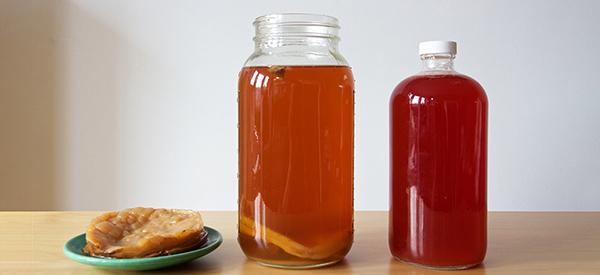
How to Make Medicinal Kombucha at Home
Have you ever wondered what kombucha is and how to make it? Kombucha, which is a fermented tea, is a wonderful drink with many health benefits for your body. Making kombucha at home is very simple and safe.
To make kombucha, you need to use a symbiotic culture of bacteria and yeast (SCOBY). It’s formed after the completion of a unique fermentation process of lactic acid bacteria, acetic acid bacteria, and yeast. Many substances that have a positive effect on humans are created in kombucha, and these beneficial effects have been known for thousands of years.
What Kombucha Contains And Its Positive Effects
SCOBY, which is an accumulation of bacteria and yeast, can differ in appearance from one culture to another. A healthy SCOBY always looks like a wet and slimy mushroom. It is the most important part of the kombucha making and will be added into our mix. The mix contains water, tea, sugar, and, in our case, medicinal plants. During the fermentation process, several reactions take place in sweetened tea, resulting in the formation of healthy substances.
Thanks to fermentation and brewing, kombucha is rich in probiotics, which have positive effects on the digestive tract and immunity. In the formation of kombucha, sugar is consumed by the yeast, releasing various valuable substances, such as iron, potassium, calcium, magnesium, sodium, zinc, and vitamins B1, B2, B6, B12, C, D, E, and K. In addition, you will also find alcohol, acetic acid, oxalic acid or gluconic acid, carbon dioxide, and yeast.
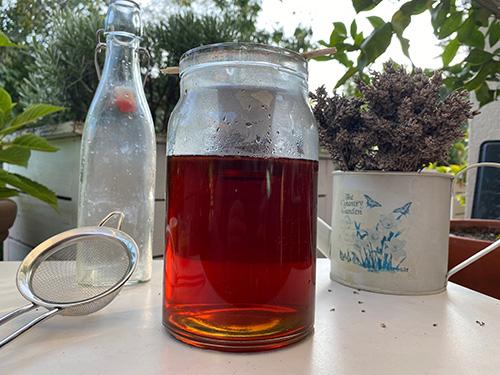
Benefits:
- Strengthens the immune system
- Has antibacterial and antifungal effects
- Detoxifies the body
- Supports digestion and the activity of the small and large intestines
- Strengthens brain activity and regenerates the nervous system
- Reduces physical fatigue and relieves tension
- Activates metabolism
- Supplies energy and vitality
Preparation
You can make your own kombucha at home and enjoy its benefits. It’s easy and a lot of fun. When making kombucha, you have to realize that you are working with a living culture that reacts to the outside world. It can react with oxygen, temperature, its alimentation, or the sun. That’s why you will never make kombucha that looks or tastes the same.
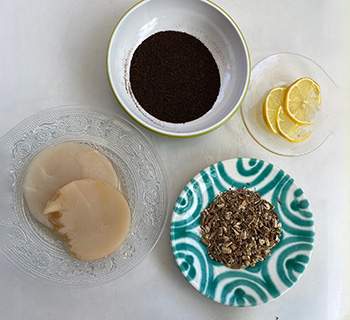
Ingredients:
- Glass jar (0.5 gallon or more)
- Filtered water (0.5 gallon)
- Black or green tea (2 ½ teaspoons or 10 teabags)
- Dandelion root (3 teaspoons)
- A few slices of a lemon
- Sugar (3.5 oz. or 7 tablespoons)
- SCOBY culture or culture from a previous kombucha
- Filter paper or linen
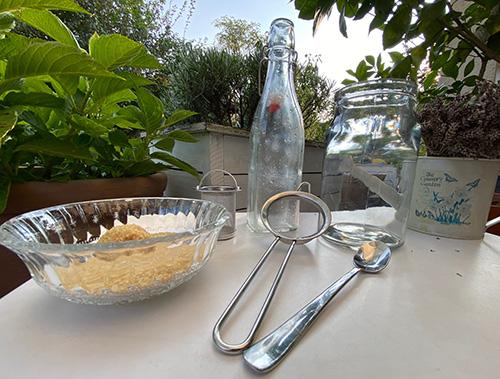
Note: Prepare kombucha in a glass container as glass is the safest of the available materials. If you prepare it in metal or plastic, it could cause unwanted chemical reactions and degrade it. When making kombucha, do not forget to observe maximum hygiene and cleanliness.
Recipe
- Boil half a gallon of filtered water, and make a strong sweet tea using quality black or green tea and organic sugar. To make half a gallon of tea, you will need approximately 5 tea bags and 7 tablespoons of sugar.

- Then add the dandelion roots.
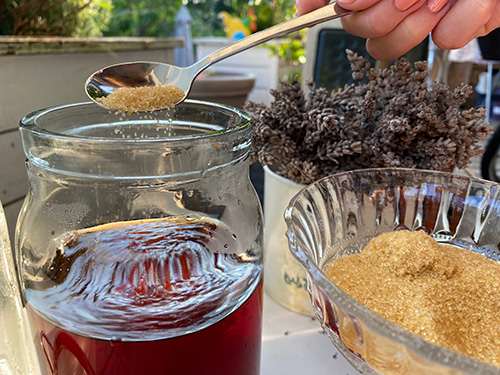
- Allow the tea to cool to room temperature. This is an important step because if you put your SCOBY in hot water, you will kill it.
- When the tea is at room temperature, pour it into a glass jar. It is best if you still have some free space in the container after pouring the tea in.
- If you are just starting out with kombucha, you will have the culture purchased in the store. Add kombucha infusion to the tea, and insert the kombucha culture.
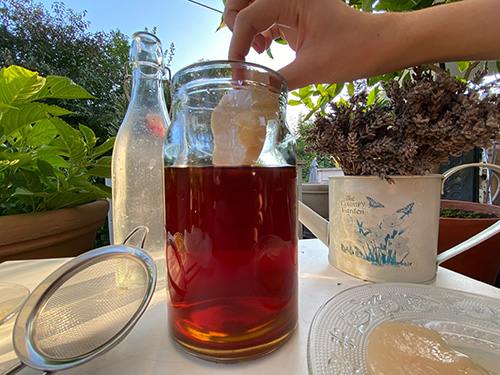
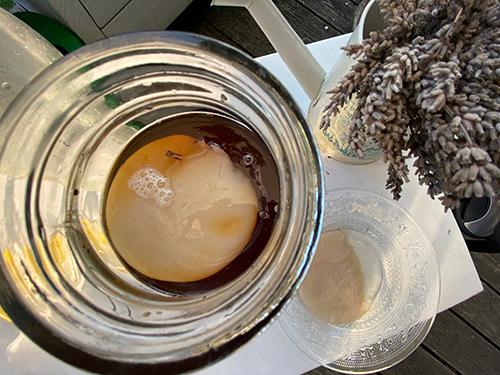
- The kombucha needs to breathe oxygen, so you should cover the jar with filter paper or linen and hold it in place with a rubber band. Look for any openings and cover them to prevent insects from entering. Remember that insects are dangerous for your kombucha.
- Place the jar in a room with a consistent temperature, preferably at a room temperature of around 25°C with no sunlight, and leave to ferment for 7 days. We do not recommend lower temperatures, as temperatures below 18°C are unsuitable for kombucha and will prevent fermentation.
- After a week, pour the kombucha through a sieve into a clean cup, add lemon (as much as you wish), close with an airtight cap, and store in the refrigerator.

TIP: For a more pronounced taste and more bubbles, pour it into a new glass container after a week and then let it ferment for another few days.
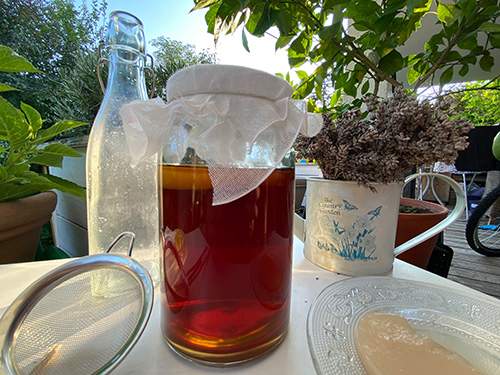
If you want to use kombucha for further fermentation, carefully take the cultures that have formed on the surface, together with the parent culture, out of the jar, rinse them with water, and put them into a new jar filled with tea.
You may also like:
 The 7 Most Powerful Medicinal Tea Blends
The 7 Most Powerful Medicinal Tea Blends
What Happens If You Pour Honey Over Jalapenos? (Video)
10 Natural Sweeteners and Sugar Alternatives

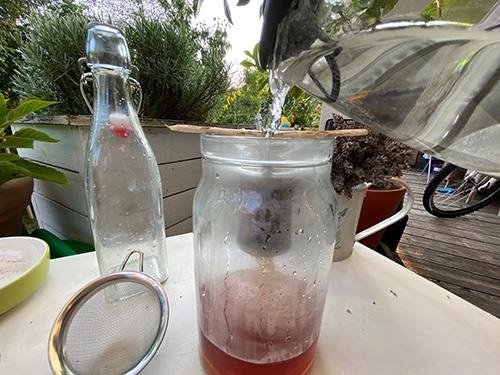
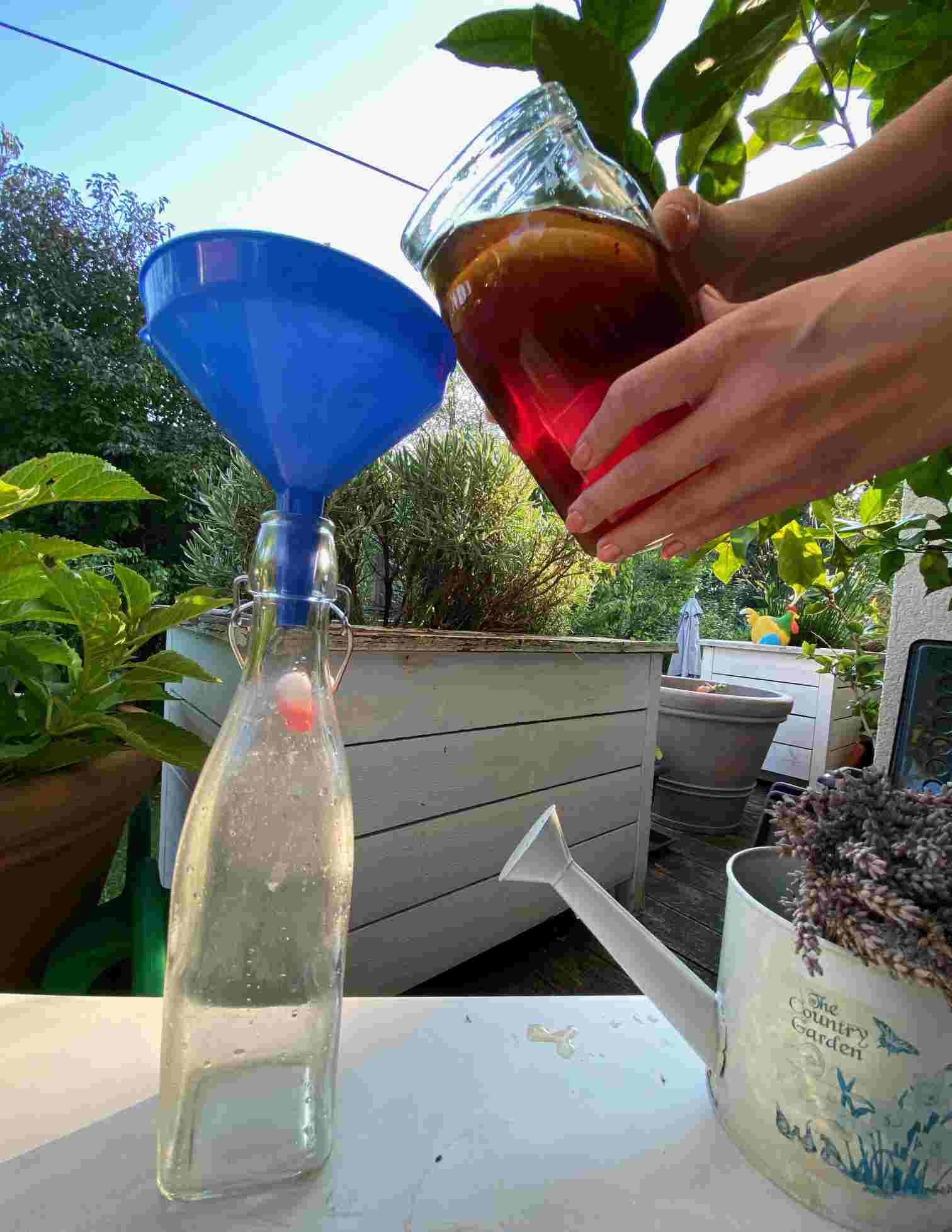
I have a Kombucha Scoby that I put in my storage room with all the fixings to make another batch at a later date. Time has gone by, 6 months or so, It has the 1 cup of Kombucha in with it in a zip lock bag. Is it safe for me to make a batch now using that Scoby? It has been quite hot in the storage room through the summer months. Also what does the Dandelion Root do for it? I have never used it before in making Kombucha….Thank you Betty
Hi Betty,
Adding herbs to your kombucha brew can help you get the anti-inflammatory, anti-oxidant, and other benefits of the herbs in a tasty way.
Different herbs may bring different results.
Dandelion root promotes healthy digestion. Dandelion is also high in vitamins and minerals and is used as a tonic for the liver.
You can flavor kombucha to your own liking.
God bless!
Hi Betty,
While I can’t guarantee safety, I can share a similar experience I had earlier this year: like you, I left a SCOBY on its lonesome for quite some time. In my case, the liquid in the jar actually evaporated so much that the SCOBY began to dry out, and started getting mouldy!
Most people would tell you that a mouldy SCOBY is a complete write-off (it’s basically dying) but, being a sentimental sort, I didn’t want to throw it away and get another one – I wanted to continue the family line! So eventually I fished it out, carefully washed off all the mouldy bits, and put it back in a fresh jar of sweet tea.
Now I have to say it was not plain sailing. For the first couple of weeks, I had to keep a very keen look-out for mould re-growing in my jar. Whenever it did, I would fish it out with a scalded metal spoon. It required a lot of vigilance – more trouble than it was worth, for sure!
I’m not super experienced at kombucha-making (see above – clearly the exuberance of naivety), but I got the impression that it took a longer time for my poor, old SCOBY to kick into gear. However eventually the magic started happening, and once it was underway, the liquid was naturally acidic enough to prevent further mould from appearing.
I think that first batch was blown just on nursing the SCOBY back to health. From then on, it seems to be working again as normal and (despite my wife’s deep suspicion of the whole process!) I can tell you that we’ve been enjoying the fruits of our labors, albeit they’re on the vinegary side – still getting the knack of timing when a batch is done.
Hope you’re able to save your SCOBY too!
10 teabags for 1/2 gallon??? That’s double what I use. Is it because it’s medicinal???
Hi Debra,
The author used 10 bags and Dandelion root for this medicinal kombucha recipe.
But you can always use less quantity of black tea if it’s too strong for you.
And you can flavor kombucha to your own liking.
God bless!
In place of the sugar is it ok to use honey please?
Hi Susan,
Thank you for your comment.
Yes, you can use honey as well.
God bless!
I have several scoby’s. Can I dehydrate them and use as a probiotics supplement?
Hi Rita,
SCOBYs can be dehydrated by placing them on a sheet of unbleached parchment paper and allowing them to dry in a warm spot (around 80° to 90°F) until they are the consistency of jerky.
Drying several SCOBYs is a good idea, as the process isn’t normally very precise and there is a failure rate. Once the SCOBYs are dehydrated, place them in a sealable plastic bag and store them in the refrigerator (not the freezer).
Dehydrated SCOBYs will generally survive in the refrigerator for at least 3 months.
God bless!
I make my Own Kombucha..what about something to add to the tea for inflamation..
how much dandillion root do you add
Is the black tea only for taste and can I replace it with something else? Thanks
The SCOBY is organically fine tuned to thrive on black tea. There is another type called a Jun SCOBY which lives on green tea.
Dosage?
Can you please give me a reputable source to get a scoby?
Sometimes you can find them offered on craigslist. They are also available at Amazon. https://amzn.to/435SjN0
If you have the time and patience, you can grow your own using active kombucha from the grocery store. Instructions are easily found with a quick internet search.
Is their any way to make your own SCOBY culture
Gene, I’d also like the home culture if some one relayed it to you. ‘just read the article, 2/15/’22
I’m Gary, at GaryU.S.MALE@gmail.com
Thank you very much.
I’ve been making Kombucha for many years. I use all kinds of different teas. I try to always use at least 3 black tea bags, and all the rest are different flavors of teas, all organic. My scoby just lives on and on!
Catherine, I see you didn’t get an answer. I make my own Kombucha and the answer to your question is NO. I am so sorry. Mine makes many scobies, which I give extras to the dog for his health. He loves them. If you know anyone that makes Kombucha, perhaps they would share one of their new ones with you. I got my first one from a friend. I don’t have any extras now, or I would mail one to you. Mail is risky in the winter, but I sent one in the summer that worked well. Also I noticed instructions say to wash it off with water, and that concerns me. If you have city water, the chlorine will kill it. So I am sure they meant distilled water. I use vinegar, myself, to wash off a scoby. If you have cooled sweet tea and a scoby, it will make kombucha. It just takes a little longer if you don’t have some kombucha to add to the new batch.